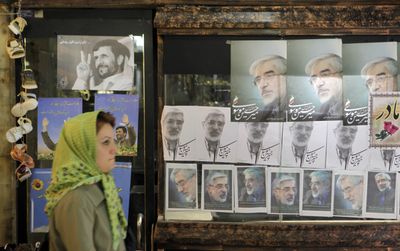Election could transform Iran’s international stance

TEHRAN, Iran – After an exuberant campaign season, voters across this country of 70 million head to the polls today in a fiercely contested presidential election with potentially broad domestic and international repercussions.
Washington and capitals around the world are tensely anticipating the outcome of the vote, which pits incumbent Mahmoud Ahmadinejad against reformist Mir-Hossein Mousavi and two other challengers. The Islamic Republic and the West are at odds over Iran’s nuclear program and support for militant groups that oppose Israel. Pro-American Arab leaders have decried Iran’s rising ambitions.
The next president, analysts say, will play a key role in formulating Iran’s response to the Obama administration’s offer of comprehensive talks after a 30-year cold war between Tehran and Washington.
“There’s a hope that if Ahmadinejad is not re-elected this might facilitate engagement with Iran, specifically on the nuclear issue,” said Ali Reza Nader, an analyst at the Rand Corp.
For Iranian voters, the election has emerged as a referendum on Ahmadinejad, pitting those who support his populist economic policies and fiery international posture against those angered by his conservative social policies and his perceived damaging of Iran’s relations with the West.
If Ahmadinejad is re-elected, the West will look hard to see whether his government is prepared to tone down its rhetoric and enter into talks over Iran’s nuclear program.
“Ahmadinejad says, ‘Come here and let’s debate. Let’s argue,’ ” said Ahmad Bakhshayeshi, a political scientist and supporter of conservative candidate Mohsen Rezai. “But the U.S. isn’t going to debate anything with us. Mousavi, on the other hand, wants to negotiate.”
If Mousavi wins, many wonder whether Supreme Leader Ali Khamenei will give him leeway to broker a deal with the West. Khamenei wields ultimate authority over critical matters of state, such as the nuclear program.
Regardless of the outcome, the raucous campaign has unleashed new forces into the Islamic Republic’s normally staid political culture. Deep simmering fissures within the establishment emerged in televised debates between the candidates. Young and old poured into the streets to voice their displeasure with the policies of Ahmadinejad, whose attachment to the ideologically strident and militant values of the early years of the 1979 revolution has alienated many in the voting blocs of young people, the middle class, the educated and women.
Ahmadinejad broke new ground by publicly accusing some of the system’s top clerics of corruption. That led the country’s top power broker, Ali Akbar Hashemi Rafsanjani, to demand that Khamenei rein in Ahmadinejad or risk unrest.
The clashes between the titans and the colorful street displays have drawn ordinary people into debates about nuclear energy, the Arab-Israeli conflict and relations with the United States.
“These are signs of the growth and health of our Islamic democracy,” said Mohammad-Kazem Anbarlui, editor of the pro-Ahmadinejad newspaper Resalat. “It’s not who runs in an election that counts. It’s who participates.”